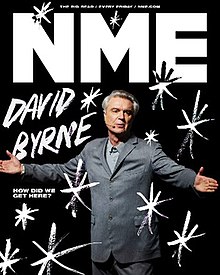
Back موسيقى اكسبرس جديدة Arabic New Musical Express BE এনএমই Bengali/Bangla NME Catalan NME Czech NME CY New Musical Express Danish NME (Zeitschrift) German NME Spanish انامئی FA
This article may rely excessively on sources too closely associated with the subject, potentially preventing the article from being verifiable and neutral. (March 2023) |
 | |
 December 2020 cover of the digital issue, featuring David Byrne | |
| Categories | Music and pop culture media |
|---|---|
| Frequency | Weekly (1952–2018) Bimonthly (2023–present) |
| Founder | Theodore Ingham |
| Founded | 1952 |
| First issue | 7 March 1952 – 9 March 2018, 2023–present (print) 1996 (online) |
| Company | NME Networks |
| Country | United Kingdom |
| Based in | London, England |
| Language | English |
| Website | www |
| ISSN | 0028-6362 |
New Musical Express (NME) is a British music, film, gaming, and culture website[1] and brand. Founded as a newspaper in 1952, with the publication being referred to as a "rock inkie",[2] the NME would become a magazine that ended up as a free publication, before becoming an online brand which includes its website and radio stations.[3][4][5]
As a "rock inkie", NME was the first British newspaper to include a singles chart, adding that feature in the edition of 14 November 1952. In the 1970s, it became the best-selling British music newspaper. From 1972 to 1976, it was particularly associated with gonzo journalism[citation needed] then became closely associated with punk rock through the writings of Julie Burchill, Paul Morley, and Tony Parsons. It started as a music newspaper, and gradually moved toward a magazine format during the 1980s and 1990s, changing from newsprint in 1998.
The magazine's website NME.com was launched in 1996, and became the world's biggest standalone music site, with over sixteen million users per month.[citation needed] With newsstand sales falling across the UK magazine sector in the early 21st century, the magazine's paid circulation in the first half of 2014 was 15,830.[6] In September 2015, the NME magazine was relaunched to be distributed nationally as a free publication.[7] The first average circulation published in February 2016 of 307,217 copies per week was the highest in the brand's history, beating the previous best of 306,881, recorded in 1964 at the height of the Beatles' fame.[8] By December 2017, according to the Audit Bureau of Circulations, average distribution of NME had fallen to 289,432 copies a week,[9] although its then-publisher Time Inc. UK claimed to have more than 13 million global unique users per month, including 3 million in the UK.[10] In March 2018, the publisher announced that the print edition of NME would cease publication after 66 years and become an online-only publication.[11][12] However, this decision was reversed in 2023, with NME announcing that it would revive its print magazine as a bimonthly release.
NME was acquired in 2019 by Singaporean music company BandLab Technologies, which put all of its music publications under the NME Networks brand in December 2021, when the company was restructured.[13]
- ^ "The 20 best films of 2020". NME. 10 December 2020.
- ^ Sutcliffe, Phil (9 May 2004). "The king of the inkies". Los Angeles Times.
- ^ "NME Radio: How to tune in, where to listen, and everything you need to know". NME. 13 June 2018.
- ^ "NME Radio | Listen on Web, Mobile, Apple Music, DAB & More". NME Radio.
- ^ "Listen to NME 1 on TuneIn". TuneIn.
- ^ Reynolds, John (16 August 2012). "NME and Q suffer major circulation falls". Media Week. London. Retrieved 14 September 2012.
- ^ "NME magazine to be given away free". BBC News. 6 July 2015. Retrieved 6 July 2015.
- ^ Sherwin, Adam (11 February 2016). "NME readership soars past 1960s Beatles peak six months after going free". The Independent. Archived from the original on 18 June 2022. Retrieved 20 November 2016.
- ^ "NME average circulation". Audit Bureau of Circulations Ltd, 15 February 2018.
- ^ "NME faced "ongoing losses"". Press Gazette, 8 March 2018.
- ^ Mayhew, Freddy (7 March 2018). "NME to stop publishing weekly print magazine". Press Gazette.
- ^ Petridis, Alexis (7 March 2018). "Farewell to NME: a rock'n'roll riot that petered into silence | Alexis Petridis". The Guardian. Retrieved 8 March 2018.
- ^ "BandLab Technologies announces launch of NME Networks". Inpublishing.co.uk. 15 November 2021. Retrieved 25 October 2023.